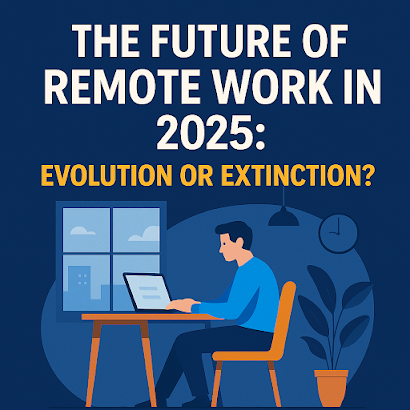The Shift That Shook the World
It’s 2025. Remember when remote work was once considered a privilege or a temporary fix? Now, it's a strategic, transformative force that’s reshaping how we think about productivity, lifestyle, and business growth. The pandemic may have catalyzed the shift, but the evolution didn’t stop there. In fact, remote work in 2025 is thriving, sophisticated, and smartly integrated into the global economy.
Why Remote Work Isn’t Going Anywhere
Remote work isn’t a phase—it’s a pivotal movement in the modern workforce. Let’s explore why it’s here to stay.
Economic Incentives Driving Remote Policies
Companies are saving 30%–50% on infrastructure costs by going remote. From reduced office rent to decreased utility bills, the financial upside is clear.
-
Lower operational costs
-
Access to global talent without relocation expenses
-
Reduced employee turnover and absenteeism
Even governments are incentivizing remote job creation to attract digital workers and rebuild rural economies.
Sustainability and Eco-friendly Work Models
Remote work directly impacts carbon footprints. No commutes mean fewer emissions. Companies embracing remote models report:
-
60% drop in daily CO₂ emissions
-
Improved sustainability ratings
-
Employee satisfaction from supporting eco-conscious work setups
This green shift is a huge motivator, especially for Gen Z and millennial workers.
Remote Work vs. Hybrid Models: What’s Winning?
Case Studies of Top Companies
-
Microsoft: Hybrid-first but allows full remote for select roles.
-
Spotify: Launched the “Work from Anywhere” initiative.
-
Airbnb: 100% remote workforce, resulting in a 30% spike in job applications.
Benefits and Drawbacks of Each Model
| Model | Pros | Cons |
|---|---|---|
| Fully Remote | Flexibility, cost savings, talent access | Isolation, time-zone challenges |
| Hybrid | Team collaboration, work-life balance | Commuting stress, unequal experiences |
| On-site | High control, instant collaboration | Limited hiring pool, higher overhead |
Hybrid might offer the best of both worlds, but fully remote roles are dominating in tech, marketing, and creative industries.
The Technology Behind the Transformation
AI and Automation in Remote Roles
In 2025, AI handles 40% of routine tasks, freeing employees to focus on creativity, strategy, and problem-solving. Tools like:
-
AI project managers
-
Smart meeting transcribers
-
Predictive workload balancers
are revolutionizing productivity.
Cybersecurity for Distributed Teams
With dispersed teams comes risk. Zero-trust security, encrypted file sharing, and biometric logins are now standard. Companies invest heavily in:
-
Virtual private networks (VPNs)
-
AI-powered threat detection
-
Security awareness training
Remote Work Trends in 2025
Digital Nomadism 2.0
Forget Bali. Remote professionals are now relocating to Eastern Europe, South America, and rural Japan—places offering incentives and better infrastructure.
-
Digital Nomad Visas
-
Co-living spaces
-
Local tax benefits
Rise of Virtual Headquarters
Companies are building 3D virtual offices using platforms like Gather and Meta Horizon Workrooms. These aren't just video calls—they replicate the office experience.
The Global Impact of Remote Work
Opportunities in Developing Nations
Global hiring is giving skilled workers in countries like India, Nigeria, and the Philippines access to Western salaries without relocation.
Cross-border Employment Laws
To support this, countries are:
-
Updating labor laws
-
Creating digital residency programs
-
Ensuring tax compliance across borders
Read more about international remote work laws here.
How Professionals Can Prepare for a Remote Future
Essential Skills for Remote Success
To thrive in a remote-first future, professionals need:
-
Self-discipline and time management
-
Asynchronous communication skills
-
Digital literacy (e.g., Slack, Trello, Notion)
Certifications and Courses in 2025
Certifications now in demand:
-
Remote Work Professional Certificate (RWPC)
-
Coursera’s “Leading Remote Teams”
-
HubSpot’s Remote Collaboration Badge
Business Adaptation: From Startups to Enterprises
How SMEs Are Leading Remote Work Innovation
Small businesses are agile. They’re using:
-
Freelancer networks
-
Project-based hiring
-
Subscription-based office spaces
Enterprise Remote Culture and Productivity
Large companies are shifting from monitoring to outcomes-based KPIs, where results matter more than hours logged in.
Common Challenges and Proven Solutions
Communication and Time-Zone Differences
Solutions:
-
“Follow the sun” workflows
-
Async-first communication (Loom, Miro)
-
Time zone overlap calendars
Mental Health and Work-Life Balance
Companies are offering:
-
Monthly wellness stipends
-
Virtual therapy sessions
-
“No-meeting” Fridays
Remote Work Tools Dominating 2025
Top Collaboration Platforms
-
Slack: Enhanced with AI summarization
-
Zoom 2.0: Now includes spatial audio and real-time captioning
-
ClickUp: One platform for tasks, docs, and goals
Emerging Tech Tools to Watch
-
Holographic meeting tools
-
AI co-pilots for emails and code
-
Focus-enhancing productivity apps (e.g., Serene, Brain.fm)
FAQs
1. Is remote work still popular in 2025?
Yes, it’s more normalized than ever—especially in tech, creative, and customer service roles.
2. What are the best countries for digital nomads in 2025?
Portugal, Georgia, Mexico, and Estonia top the list due to low cost of living, digital visas, and strong infrastructure.
3. Do remote jobs pay less?
Not always. Many remote jobs now offer location-independent salaries, especially in competitive industries.
4. How do companies ensure remote productivity?
They use tools like ClickUp, performance dashboards, and weekly check-ins, focusing on output over hours.
5. Can I work remotely for a US company from abroad?
Yes, but you must comply with local tax and employment laws. Many companies use platforms like Remote.com to handle compliance.
6. What careers are best for remote work?
Software development, content creation, marketing, customer support, project management, and data analysis are leading sectors.
Conclusion: Evolution, Not Extinction
Remote work in 2025 is not dying—it’s evolving into a smarter, more flexible system that benefits both employees and employers. The businesses that thrive are those adapting fast, investing in tech, and supporting remote culture. For professionals, the future is wide open—literally. Whether you’re managing a global team or logging in from a mountain cabin, the remote work revolution is far from over.


.jpg)

.jpg)
No comments:
Post a Comment